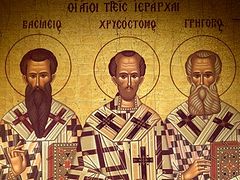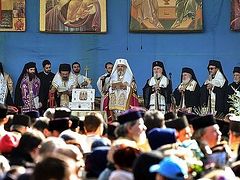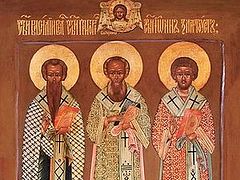The holy hierarchs Basil the Great, Gregory the Theologian, and John Chrysostom are known as great theologians and fathers of the Church. Every saint is an example of the life in Christ, an example for every believer. There is no doubt that much can be said about the lives of these three great hierarchs of the Orthodox Church, but I would like to focus on one thing: to look more closely at the life of the families in which the holy hierarchs Basil, Gregory, and John were born and raised. What do we know about them?
Most importantly—the family of each of the great holy hierarchs is a holy family in the fullest sense of the word. Many of the members of these families are glorified by the Church. In the family of St. Basil the Great are his mother St. Emilia (January 1/14), his sisters St. Macrina (July 19/August1) and St. Theosebia, a deaconess (January 10/23), and his brothers St. Gregory of Nyssa (January 10/23), and St. Peter of Sebaste (January 9/22). St. Gregory of Nyssa writes, “My father’s parents’ property was taken away for their confession of Christ, and our grandfather on our mother’s side was executed because of imperial anger, and everything he had passed to other proprietors.”1 The mother of St. Basil the Great’s father was St. Macrina the Elder2 (May 30/June 12). Her spiritual guide was St. Gregory of Neocaesarea, also known as St. Gregory the Wonderworker. St. Macrina took an active role in the raising of the future holy hierarch, as he himself writes about it: “I mean the celebrated Macrina who taught me the words of the blessed Gregory; which, as far as memory had preserved down to her day, she cherished herself, while she fashioned and formed me, while yet a child, upon the doctrines of piety.”3
St. Gregory the Theologian thus praises the ancestors of St. Basil: “Among whose numerous ranks were found Basil’s paternal ancestors, upon whom, in their practice of every form of piety, that period bestowed many a fair garland. So prepared and determined were they to bear readily all those things on account of which Christ crowns those who have imitated His struggle on our behalf.”4 Thus, the parents of St. Basil—Basil the Elder and Emilia—were descendants of martyrs and confessors for faith in Christ. It must be said that St. Emilia initially prepared herself for the asceticism of virginity, but, as her son St. Gregory of Nyssa writes, “Inasmuch as she was an orphan, and in the season of her youth she blossomed with such physical beauty that talk of her prompted many to seek her hand, and the threat even arose that if she didn’t marry someone willingly, then she would suffer some undesirable affront, as those driven mad by her beauty were ready even to kidnap her.”5 Therefore St. Emilia married Basil, who had the glory of an educated and pious man. Thus, the parents of the holy hierarch Basil were united first of all by love for Christ. St. Gregory the Theologian praises this truly Christian marital union: “The union of [Basil’s] parents, consisting not so much of a fleshly union as an equal striving for virtue, was notable for many reasons, especially for generosity to the poor, for hospitality, for purity of soul as the result of self-discipline, for the dedication to God of a portion of their property … and for all those other good qualities which were enough to fill the hearing of many.”6
But St. Basil’s and St. Emilia’s main virtue was their children:
Legend indeed has its instances of men whose children were many and beautiful, but it is practical experience which has presented to us these parents, whose own character, apart from that of their children, was sufficient for their fair fame, while the character of their children would have made them, even without their own eminence in virtue, to surpass all men by the excellence of their children… but when all are eminent, the honor is clearly due to those who brought them up. This is proved by the blessed roll7 of priests and virgins, and of those who, when married, have allowed nothing in their union to hinder them from attaining an equal repute, and so have made the distinction between them to consist in the condition, rather than in the mode of their life.8
St. Basil and his brothers and sisters were brought up in such a family. Their parents, having chosen the path of Christian virtues, emulating their own parents in it—testifying to their faith by martyrdom and confession, reared children who manifested in their lives all the diversity of the Christian podvig.
The family of St. Gregory the Theologian, the closest friend of St. Basil the Great, also set an example of Christian holiness. St. Gregory’s father, also named Gregory, was the bishop of the city of Nazianzus; his mother was named Nonna. They are both canonized saints (St. Gregory—January 1/14, St. Nonna—August 5/18). St. Gregory writes of his mother with great love: “She acknowledged but one kind of beauty, that of the soul, and the preservation, or the restoration as far as possible, of the Divine image… She knew but one genuine nobility—piety, and the knowledge of whence we are sprung and whither we are tending. The only safe and inviolable form of wealth is, she considered, to strip oneself of wealth for God and the poor, and especially for those of our own kin who are unfortunate.”9 St. Nonna was not only a virtuous Christian and faithful wife, but also a mentor for her husband: “The wife given by God to my father was for him not only a co-laborer, which is not very surprising, but even his leader. She herself led him by word and deed to all excellences. Day and night she fell before God, in fasting, and with many tears entreating Him to grant salvation to her head, and tirelessly influencing her husband, trying to acquire it by various means.”10 The fact is that St. Gregory’s father—Gregory the Elder—was born into a pagan family (St. Nonna’s parents were Christians) and belonged to a sect of Hypsistarians from birth.11 Through her prayerful labors and her personal example of Christian piety, St. Nonna persuaded her husband to accept the Sacrament of holy Baptism. And at the age of forty-five, Gregory the Elder was baptized, receiving the Sacrament from Archbishop Leontius of Cappadocia, who was a participant in the First Ecumenical Council in Nicaea. Within two or three years he was ordained as a presbyter, and then to the episcopate of the city of Nazianzus.
St. Gregory the Theologian wrote that, even not yet being enlightened by the light of the true faith, according to the quality of his soul and his high moral life, his father was a Christian:
Even before he was of our fold, he was ours. His character made him one of us. For, as many of our own are not with us, whose life alienates them from the common body, so, many of those without are on our side, whose character anticipates their faith, and need only the name of that which indeed they possess. My father was one of these, an alien shoot, but inclined by his life towards us… It was as a reward for such conduct, I think, that he attained to the faith.12
The word of the holy apostle Paul was fulfilled in St. Gregory’s family: For the unbelieving husband is sanctified by the wife, and the unbelieving wife is sanctified by the husband: else were your children unclean; but now are they holy (1 Cor. 7:14)
Sts. Gregory and Nonna had three children: a daughter Gorgonia, and sons Gregory and Caesarius. St. Gregory’s older sister has also been glorified by the Church (February 23/March 8). St. Gorgonia repeated the podvig of her mother—she converted her husband to Christianity:
She consecrated herself entirely to God. But what is most excellent and honorable, she also won over her husband to her side, and made of him a good fellow-servant, instead of an unreasonable master. And not only so, but she further made the fruit of her body, her children and her children’s children, to be the fruit of her spirit, dedicating to God not her single soul, but the whole family and household… presenting herself, as long as she lived, as an example to her offspring of all that was good, and when summoned hence, leaving her will behind her, as a silent exhortation to her house.13
Much less is known about the family of the third great holy hierarch and teacher of the Church St. John Chrysostom than about the families of the holy hierarchs Sts. Basil and Gregory. His parents were named Secundus and Antusa, of noble ancestry. St. John lost his father while yet a child, so he was brought up by his mother who wholly dedicated herself to the care of her son and older daughter, whose name has not been preserved. In his work On the Priesthood, St. John speaks of his mother, describing all the hardships of her life:
My child, it was not the will of Heaven that I should long enjoy the benefit of thy father’s virtue. For his death soon followed the pangs which I endured at thy birth, leaving thee an orphan and me a widow before my time to face all the horrors of widowhood, which only those who have experienced them can fairly understand. For no words are adequate to describe the tempest-tossed condition of a young woman who, having but lately left her paternal home, and being inexperienced in business, is suddenly racked by an overwhelming sorrow, and compelled to support a load of care too great for her age and sex.14
For more than twenty years his holy mother lived in widowhood, which became her Christian podvig. St. John wrote about it thus:
When I was still a young man I knew that the sophist who taught me (and he exceeded all men in his reverence for the gods) expressed admiration for my mother before a large company. For enquiring, as was his wont, of those who sat beside him who I was, and someone having said that I was the son of a woman who was a widow, he asked of me the age of my mother and the duration of her widowhood, and when I told him that she was forty years of age of which twenty had elapsed since she lost my father he was astonished and uttered a loud exclamation, and turning to those present “Heavens!” cried he, “what women there are amongst the Christians.” So great is the admiration and praise enjoyed by widowhood not only amongst ourselves, but also amongst those who are outside the Church.15
From such a courageous and patient mother St. John received his upbringing, and himself displayed not a little courage and patience in his pastoral ministry upon the capital diocesan throne. Although St. John’s parents are not glorified as saints, it is impossible not to name the family in which was born and raised the greatest Church preacher and pastor.
The raising of children in the Christian faith is the greatest podvig and duty of every faithful family, and the best upbringing is the personal example of a Christian life, transmitted from parents to children, going from generation to generation. We see this in the family of St. Basil the Great. An example of the podvig of Christian wives turning their unbelieving husbands to Christ is shown to us by the family of St. Gregory the Theologian in the persons of his mother and elder sister. Fortitude, courage, and patience in sorrows and troubles are shown to us by the mother of St. John Chrysostom. Therefore, the feast of the Three Holy Hierarchs can also be considered the feast of their families, who raised children who became pillars of the Church of Christ.




